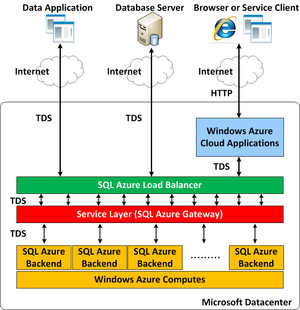Microsoft Azure Sql Database Vs Sql Server
 | |
 | |
| Developer(s) | Microsoft |
|---|---|
| Initial release | 2010; 11 years ago (2010) |
| Available in | English |
| Type | Managed cloud database |
| Website | azure |
Microsoft Azure SQL Database (formerly SQL Azure, SQL Server Data Services, SQL Services, and Windows Azure SQL Database)[1] is a managed cloud database (PaaS) provided as part of Microsoft Azure.
A cloud database is a database that runs on a cloud computing platform, and access to it is provided as a service. Managed database services take care of scalability, backup, and high availability of the database. Azure SQL Database is a managed database service which is different from AWS RDS which is a container service.
Overview [edit]
Microsoft Azure SQL Database includes built-in intelligence that learns app patterns and adapts to maximize performance, reliability, and data protection. It was originally announced in 2009 and released in 2010.
Key capabilities include:
- Continuous learning of your unique app patterns, adaptive performance tuning, and automatic improvements to reliability and data protection[2]
- Scaling as needed, with virtually no app downtime[3]
- Management and monitoring of multitenant apps with isolation benefits of one-customer-per-database[4]
- Leverage open source tools like cheetah,[5] sql-cli,[6] VS Code[7] and Microsoft tools like Visual Studio[8] and SQL Server Management Studio,[9] Azure Management Portal, PowerShell, and REST APIs
- Data protection[10] with encryption, authentication, limiting user access to the appropriate subset of the data, continuous monitoring and auditing to help detect potential threats and provide a record of critical events in case of a breach
Popular use cases [edit]
- Relational data storage for cloud based applications and web sites
- Business and consumer web and mobile apps
- Manage databases for multi-tenant apps (software-as-a-service)
- Quickly create dev and test databases to speed up development cycles
- Scale production business services quickly and at a known cost
- Containerize data in the cloud for isolation and security
- Outsource database management in order to focus on value-added services
Design [edit]
Azure SQL Database shares the SQL Server 2016 codebase. It is compatible with SQL Server 2014 and 2016 and most of the features available in SQL Server 2016 are available in Azure SQL Database. A list of incompatibilities[11] is published by Microsoft.
Timeline [edit]
- 2009 – Service announced[12]
- 2010 – Service went live[13]
- 2014 – New version announced[14]
- 2015 – Elastic Pools announced[15]
Pricing [edit]
Azure SQL Database is offered either as a Standalone database or Elastic database pool, and is priced in three tiers: Basic, Standard and Premium. Each tier offers different performance levels to accommodate a variety of workloads.
The resources available for Standalone databases are expressed in terms of Database Transaction Units (DTUs) and for elastic pools in terms of elastic DTUs or eDTUs. A DTU is defined as a blended measure of CPU, memory, and data I/O and transaction log I/O in a ratio determined by an OLTP benchmark workload designed to be typical of real-world OLTP workloads.
Databases are available as Standalone databases or in database pools which allow multiple databases to share storage and compute resources.
| Service tier | Target workloads |
|---|---|
| Basic | Best suited for a small database, supporting typically one single active operation at a given time. Examples include databases used for development or testing, or small-scale infrequently used applications. |
| Standard | The go-to option for most cloud applications, supporting multiple concurrent queries. Examples include workgroup or web applications. |
| Premium | Designed for high transactional volume, supporting many concurrent users and requiring the highest level of business continuity capabilities. Examples are databases supporting mission critical applications. |
It is also available as a limited service offering with a trial Web site or Mobile service and eligible for use with an Azure trial subscription.
See also [edit]
- Microsoft Azure
- Oracle Cloud Platform
- SQL Server
- Amazon Relational Database Service
- Relational Database
- Cloud computing
- Software as a service
References [edit]
- ^ "MS Branding".
- ^ Rabeler, Carl (October 13, 2016). "Azure SQL Database Learns & Adapts". Retrieved 2016-11-03 .
- ^ Rabeler, Carl (October 13, 2016). "Azure SQL Database Scales on the fly".
- ^ Rabeler, Carl (October 13, 2016). "Builds Multi-tenant Apps with Azure SQL Database With Isolation and Efficiency".
- ^ "wunderlist/cheetah". GitHub . Retrieved 2016-11-03 .
- ^ "sql-cli". npm . Retrieved 2016-11-03 .
- ^ "Visual Studio Code - Code Editing. Redefined". code.visualstudio.com . Retrieved 2016-11-03 .
- ^ "Any Developer, Any App, Any Platform | Visual Studio". www.visualstudio.com . Retrieved 2016-11-03 .
- ^ "Use SQL Server Management Studio". msdn.microsoft.com . Retrieved 2016-11-03 .
- ^ Rabeler, Carl (September 13, 2016). "Azure SQL Database Secures and Protects".
- ^ Byham, Rick (August 30, 2016). "Azure SQL Database Transact-SQL differences".
- ^ "SQL Data Services announces plans to accelerate core relational database features". azure.microsoft.com . Retrieved 2016-11-03 .
- ^ "SQL Azure - The Year in Review". azure.microsoft.com . Retrieved 2016-11-03 .
- ^ "Preview for greater SQL Server compatibility coming soon to Azure SQL Database". azure.microsoft.com . Retrieved 2016-11-03 .
- ^ "Azure continues to be the best place for Software as a Service". azure.microsoft.com . Retrieved 2016-11-03 .
External links [edit]
- Official website
- Microsoft Azure Security Technologies
- What is Azure SQL Database?
Microsoft Azure Sql Database Vs Sql Server
Source: https://en.wikipedia.org/wiki/Microsoft_Azure_SQL_Database
0 Response to "Microsoft Azure Sql Database Vs Sql Server"
Post a Comment